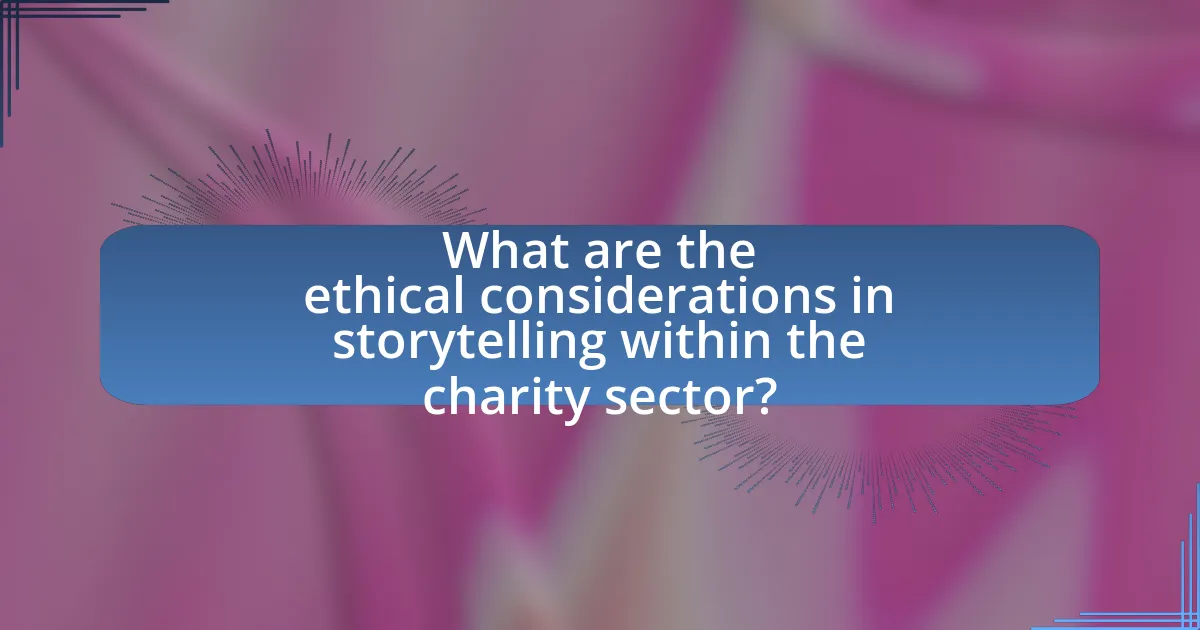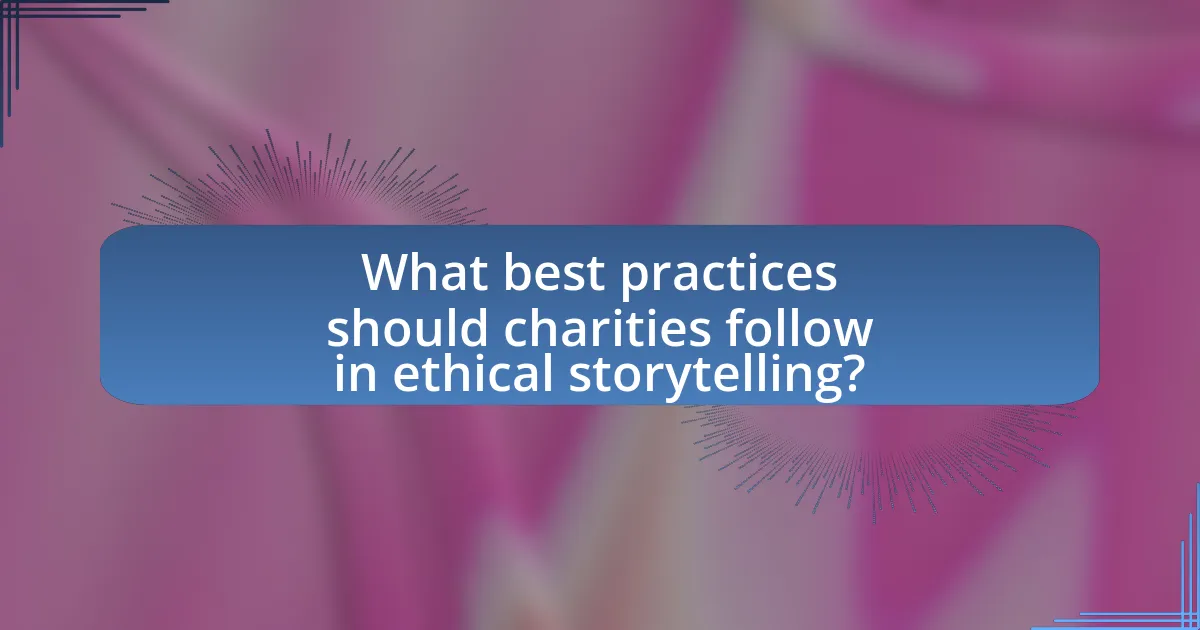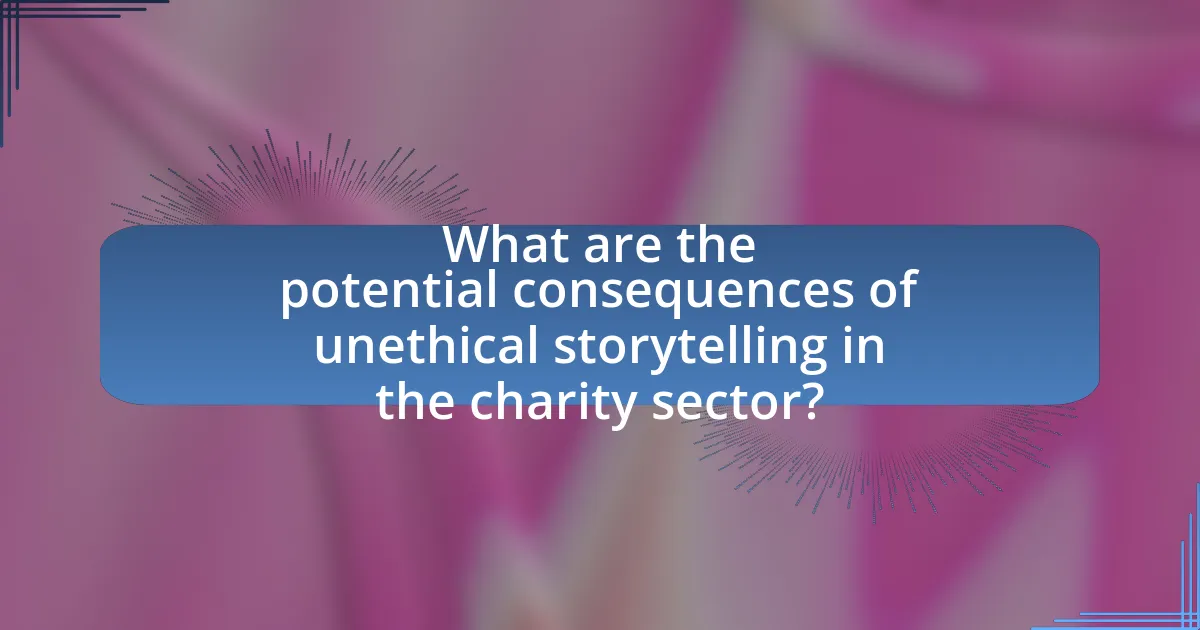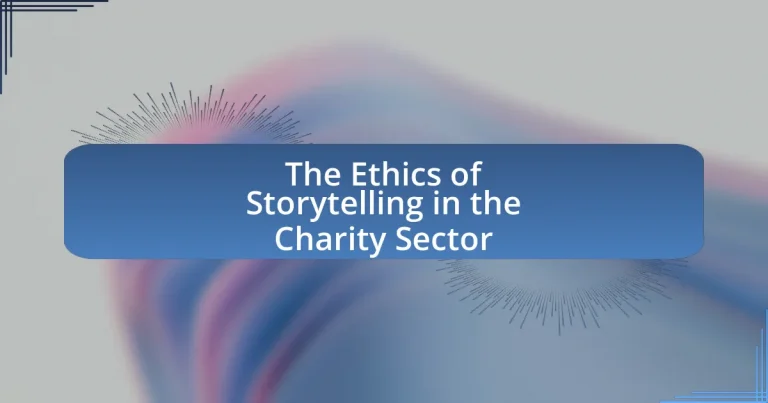The article focuses on the ethics of storytelling in the charity sector, emphasizing the importance of accuracy, dignity, and the avoidance of exploitation in narratives. It discusses how ethical storytelling can enhance donor engagement and trust, while also addressing potential ethical dilemmas such as misrepresentation and cultural insensitivity. Key strategies for charities include obtaining informed consent, co-creating stories with communities, and maintaining transparency in communications. The article highlights the legal implications of unethical practices and provides practical tips for developing storytelling policies that align with ethical standards.

What are the ethical considerations in storytelling within the charity sector?
Ethical considerations in storytelling within the charity sector include the need for accuracy, respect for the dignity of individuals represented, and the avoidance of exploitation. Charities must ensure that stories are truthful and not misleading, as misrepresentation can damage trust and credibility. Respecting the dignity of individuals involves obtaining informed consent and portraying subjects in a way that honors their experiences rather than reducing them to mere narratives for fundraising. Additionally, avoiding exploitation means that charities should not sensationalize suffering or manipulate emotions for financial gain, as this can perpetuate harmful stereotypes and undermine the agency of those being represented. These considerations are crucial for maintaining ethical standards and fostering genuine connections with donors and beneficiaries.
Why is storytelling important for charities?
Storytelling is important for charities because it effectively communicates their mission and impact, fostering emotional connections with potential donors and supporters. Charities that utilize storytelling can illustrate the real-life consequences of their work, making abstract concepts tangible and relatable. For instance, a study by the Stanford Social Innovation Review found that narratives can increase donations by up to 50% compared to statistics alone, demonstrating that stories resonate more deeply with audiences. This emotional engagement not only drives financial support but also builds trust and loyalty, essential for long-term relationships with stakeholders.
How does storytelling influence donor engagement?
Storytelling significantly enhances donor engagement by creating emotional connections that resonate with potential supporters. When charities share compelling narratives about their mission and the impact of donations, they evoke empathy and inspire action. Research indicates that stories can increase donor retention rates by up to 50%, as they help individuals visualize the difference their contributions make. For instance, a study by the Stanford Social Innovation Review found that storytelling can lead to a 20% increase in donations when compared to traditional fundraising methods. This demonstrates that effective storytelling not only captures attention but also fosters a deeper commitment to the cause, ultimately driving higher levels of engagement and support from donors.
What role does emotional appeal play in charity storytelling?
Emotional appeal is crucial in charity storytelling as it effectively engages donors and motivates them to contribute. By eliciting feelings of empathy, compassion, and urgency, emotional narratives create a personal connection between the audience and the cause. Research indicates that stories that evoke strong emotions can increase donations by up to 50%, demonstrating the power of emotional resonance in fundraising efforts. This connection not only enhances donor engagement but also fosters a sense of community and shared purpose, ultimately driving support for charitable initiatives.
What ethical dilemmas arise in charity storytelling?
Ethical dilemmas in charity storytelling primarily include the potential for exploitation of vulnerable individuals, misrepresentation of facts, and the risk of perpetuating stereotypes. Exploitation occurs when charities use personal stories of hardship without proper consent or consideration for the dignity of the individuals involved. Misrepresentation can arise when stories are exaggerated or altered to evoke stronger emotional responses, leading to a lack of transparency about the charity’s actual impact. Additionally, perpetuating stereotypes can occur when narratives reinforce negative perceptions of certain communities, rather than empowering them. These dilemmas highlight the need for ethical guidelines in storytelling practices within the charity sector to ensure respect and integrity.
How can charities avoid exploiting vulnerable populations in their narratives?
Charities can avoid exploiting vulnerable populations in their narratives by prioritizing dignity and agency in storytelling. This involves obtaining informed consent from individuals featured in narratives, ensuring they understand how their stories will be used, and allowing them to share their experiences in their own words. Research indicates that narratives that respect the autonomy of individuals lead to more ethical representations and foster trust between charities and communities. For instance, the “Ethical Storytelling” guidelines developed by organizations like the International Federation of Red Cross and Red Crescent Societies emphasize the importance of portraying individuals as active agents rather than passive victims, which can mitigate exploitation.
What are the implications of using real-life stories versus fictionalized accounts?
Using real-life stories in the charity sector fosters authenticity and trust, while fictionalized accounts can lead to ethical dilemmas and misrepresentation. Real-life narratives provide concrete evidence of impact, enhancing donor engagement and accountability, as seen in studies showing that personal stories increase donations by up to 300%. Conversely, fictionalized accounts may dilute the message and risk alienating supporters if discovered, as they can undermine the credibility of the organization. Therefore, the implications of choosing between these storytelling methods significantly affect donor perception and organizational integrity.
How do cultural sensitivities impact storytelling in the charity sector?
Cultural sensitivities significantly impact storytelling in the charity sector by shaping the narratives that resonate with diverse audiences. Charities must consider cultural norms, values, and beliefs to ensure their messages are respectful and effective. For instance, a study by the Stanford Social Innovation Review highlights that culturally aware storytelling can enhance donor engagement and trust, as narratives that align with cultural contexts are more likely to elicit emotional responses and support. Additionally, failing to address cultural sensitivities can lead to misrepresentation and backlash, undermining the charity’s mission and credibility.
What strategies can charities use to respect cultural differences in their narratives?
Charities can respect cultural differences in their narratives by employing inclusive storytelling practices that reflect the diverse backgrounds of the communities they serve. This includes engaging local voices in the narrative development process, ensuring that stories are told from the perspective of those directly affected by the issues at hand. For instance, involving community members in interviews or focus groups can provide authentic insights and prevent misrepresentation.
Additionally, charities should conduct cultural sensitivity training for their staff to understand the nuances of different cultures, which can guide how narratives are framed. Research indicates that culturally competent communication enhances trust and engagement, as seen in studies by the Stanford Social Innovation Review, which highlight the importance of cultural awareness in nonprofit storytelling.
Furthermore, charities can utilize multiple languages and culturally relevant imagery in their materials to ensure accessibility and relatability. By implementing these strategies, charities can create narratives that honor and respect the cultural identities of the individuals they aim to support.
How can charities ensure inclusivity in their storytelling practices?
Charities can ensure inclusivity in their storytelling practices by actively involving diverse voices and perspectives in the narrative creation process. This approach not only reflects the varied experiences of the communities they serve but also fosters a sense of belonging and representation. Research indicates that inclusive storytelling can enhance engagement and trust; for instance, a study by the Stanford Social Innovation Review highlights that organizations that prioritize diverse narratives see increased donor support and community involvement. By prioritizing collaboration with marginalized groups and utilizing accessible language and formats, charities can create stories that resonate with a broader audience, thereby reinforcing their commitment to inclusivity.

What best practices should charities follow in ethical storytelling?
Charities should prioritize transparency, respect, and dignity in ethical storytelling. Transparency involves clearly communicating the purpose of the story and how it relates to the charity’s mission, ensuring that the audience understands the context and intent behind the narrative. Respect entails obtaining informed consent from individuals featured in stories, allowing them to share their experiences on their own terms. Dignity is maintained by portraying subjects as empowered individuals rather than mere victims, highlighting their strengths and resilience. Research indicates that ethical storytelling can enhance donor trust and engagement, as seen in studies by the Stanford Social Innovation Review, which emphasize the importance of authenticity and ethical considerations in nonprofit communications.
How can charities maintain transparency in their narratives?
Charities can maintain transparency in their narratives by providing clear, factual information about their operations, funding, and impact. This includes disclosing financial statements, program outcomes, and the stories of beneficiaries in a way that accurately reflects their experiences. For instance, a study by the Charities Aid Foundation found that 78% of donors prefer organizations that are open about how funds are used, highlighting the importance of transparency in building trust. By consistently sharing detailed reports and engaging with stakeholders through open communication channels, charities can foster accountability and enhance their credibility.
What information should be disclosed to maintain ethical standards?
To maintain ethical standards in the charity sector, organizations should disclose information regarding the sources of funding, the intended use of donations, and the impact of their programs. Transparency about funding sources ensures that stakeholders understand potential conflicts of interest, while clarity on how donations will be utilized builds trust with donors. Additionally, sharing measurable outcomes of programs demonstrates accountability and effectiveness, which are crucial for ethical storytelling. Research indicates that 78% of donors prefer organizations that are transparent about their financial practices, highlighting the importance of these disclosures in fostering trust and ethical engagement.
How can charities balance storytelling with factual accuracy?
Charities can balance storytelling with factual accuracy by integrating data-driven narratives that highlight real experiences while ensuring that all claims are substantiated. This approach allows organizations to engage their audience emotionally through personal stories while maintaining credibility through verified statistics and facts. For instance, a charity might share a beneficiary’s story of overcoming hardship, supported by data showing the impact of their programs, such as a 30% increase in employment rates among participants. By combining compelling narratives with factual evidence, charities can effectively communicate their mission without compromising integrity.
What guidelines can help charities create impactful yet ethical stories?
Charities can create impactful yet ethical stories by adhering to guidelines that prioritize authenticity, respect, and transparency. Authenticity involves sharing real experiences and voices of beneficiaries, ensuring that stories reflect their true circumstances and perspectives. Respect entails obtaining informed consent from individuals featured in stories, allowing them to control how their narratives are shared. Transparency requires charities to disclose the purpose of storytelling, including how funds raised will be used, fostering trust with donors and the public. These guidelines help maintain ethical standards while effectively engaging audiences, as evidenced by studies showing that authentic narratives increase donor engagement and support.
How can charities involve beneficiaries in the storytelling process?
Charities can involve beneficiaries in the storytelling process by actively engaging them in sharing their personal experiences and perspectives. This can be achieved through interviews, focus groups, or workshops where beneficiaries narrate their stories, ensuring their voices are authentically represented. Research indicates that when beneficiaries participate in storytelling, it enhances the emotional connection with the audience and increases transparency, as seen in the case of organizations like StoryCorps, which emphasizes the importance of personal narratives in fostering understanding and empathy. By incorporating beneficiaries’ insights, charities not only empower individuals but also create more impactful and relatable narratives that resonate with supporters.
What are the benefits of co-creating stories with the communities served?
Co-creating stories with the communities served enhances authenticity and fosters trust. When communities actively participate in storytelling, their voices and perspectives are accurately represented, leading to narratives that resonate more deeply with audiences. This collaborative approach not only empowers individuals within the community but also strengthens relationships between organizations and the communities they aim to support. Research indicates that organizations that engage in co-creation see increased community engagement and support, as evidenced by a study published in the Journal of Nonprofit & Public Sector Marketing, which found that participatory storytelling significantly improved stakeholder trust and commitment.

What are the potential consequences of unethical storytelling in the charity sector?
Unethical storytelling in the charity sector can lead to significant consequences, including loss of donor trust and potential legal repercussions. When charities misrepresent facts or manipulate narratives, they risk alienating supporters who expect transparency and honesty. According to a 2020 study by the Charities Aid Foundation, 63% of donors stated that trust in a charity is crucial for their willingness to give. Furthermore, unethical practices can result in negative media coverage, damaging the organization’s reputation and hindering future fundraising efforts. In extreme cases, charities may face legal action for fraud or misrepresentation, as seen in several high-profile cases where organizations were penalized for misleading claims about their impact.
How can unethical storytelling damage a charity’s reputation?
Unethical storytelling can significantly damage a charity’s reputation by eroding trust among donors and stakeholders. When a charity employs misleading narratives or exaggerates the impact of its work, it risks being perceived as dishonest, which can lead to a decline in donations and support. For instance, a study by the Charities Aid Foundation found that 63% of donors are less likely to support organizations that they believe are not transparent or truthful in their communications. This loss of credibility can have long-lasting effects, as negative perceptions can spread quickly through social media and word-of-mouth, further harming the charity’s public image and ability to fulfill its mission.
What are the long-term effects on donor trust and engagement?
Long-term effects on donor trust and engagement include increased loyalty and sustained financial support for charitable organizations. When donors perceive transparency and ethical storytelling, they are more likely to continue their contributions over time. Research indicates that 70% of donors are influenced by the perceived integrity of an organization, which is bolstered by ethical communication practices. Additionally, organizations that consistently engage donors through authentic narratives see a 50% higher retention rate compared to those that do not prioritize ethical storytelling. This demonstrates that ethical practices in storytelling significantly enhance donor trust and long-term engagement.
How can negative publicity from unethical storytelling impact funding?
Negative publicity from unethical storytelling can significantly reduce funding for organizations in the charity sector. When a charity is associated with unethical practices, such as misleading narratives or exploitation of vulnerable populations, public trust diminishes. Research indicates that 70% of donors are influenced by a charity’s reputation, and negative media coverage can lead to a 30% drop in donations within a short period. This decline occurs as potential donors become wary of supporting organizations that may not align with their ethical values, ultimately impacting the charity’s ability to fulfill its mission.
What legal implications can arise from unethical storytelling practices?
Unethical storytelling practices in the charity sector can lead to legal implications such as defamation, breach of contract, and violations of privacy laws. For instance, if a charity misrepresents an individual’s story or uses their likeness without consent, it may face lawsuits for defamation or invasion of privacy. Additionally, misleading narratives can result in regulatory scrutiny and potential penalties from oversight bodies, as charities are required to adhere to truthfulness in their communications to maintain public trust and comply with fundraising regulations. These legal risks underscore the importance of ethical storytelling to avoid damaging both reputations and legal standing.
What laws govern the use of personal stories in charity communications?
Laws governing the use of personal stories in charity communications primarily include privacy laws, data protection regulations, and intellectual property rights. Privacy laws, such as the General Data Protection Regulation (GDPR) in the European Union, require charities to obtain consent from individuals before using their personal stories, ensuring that the individuals are aware of how their information will be used. Data protection regulations, like the California Consumer Privacy Act (CCPA), also mandate transparency and the right for individuals to control their personal data. Additionally, intellectual property rights protect the original expression of personal stories, meaning charities must ensure they have the right to use any narratives or images shared by individuals. These legal frameworks are essential for maintaining ethical standards in charity communications while safeguarding the rights of individuals.
How can charities protect themselves from legal repercussions?
Charities can protect themselves from legal repercussions by implementing comprehensive risk management strategies, including establishing clear policies and procedures for storytelling practices. These policies should ensure compliance with relevant laws, such as data protection regulations and intellectual property rights, which are critical in safeguarding against potential legal claims. For instance, the General Data Protection Regulation (GDPR) mandates that organizations obtain consent before using personal data, which charities must adhere to when sharing stories involving beneficiaries. Additionally, charities should conduct regular training for staff and volunteers on ethical storytelling practices to minimize the risk of misrepresentation or exploitation of individuals’ stories. This proactive approach not only mitigates legal risks but also fosters trust and transparency with stakeholders.
What practical tips can charities implement for ethical storytelling?
Charities can implement several practical tips for ethical storytelling, including prioritizing consent, representing individuals accurately, and focusing on empowerment rather than pity. Prioritizing consent involves obtaining explicit permission from individuals before sharing their stories, ensuring they are comfortable with how their narratives will be portrayed. Accurate representation means portraying individuals in a way that reflects their dignity and humanity, avoiding stereotypes or oversimplifications. Focusing on empowerment emphasizes the strengths and resilience of individuals rather than framing them solely as victims, which can foster a more positive narrative. These practices align with ethical storytelling principles that respect the dignity of those being represented and promote a more authentic connection with audiences.
How can charities develop a storytelling policy that aligns with ethical standards?
Charities can develop a storytelling policy that aligns with ethical standards by establishing clear guidelines that prioritize transparency, respect for individuals’ dignity, and informed consent. This involves creating a framework that ensures stories are told with the permission of those involved, accurately represent their experiences, and avoid exploitation or sensationalism. For instance, the Humanitarian Accountability Partnership emphasizes the importance of obtaining informed consent and ensuring that beneficiaries are aware of how their stories will be used, which reinforces ethical storytelling practices. By adhering to these principles, charities can foster trust and maintain integrity in their communications.
What resources are available for charities to improve their storytelling ethics?
Charities can access various resources to enhance their storytelling ethics, including guidelines from organizations like the Ethical Storytelling Initiative, which provides frameworks for ethical narrative practices. Additionally, the “Storytelling for Good” toolkit by the Nonprofit Marketing Guide offers practical strategies for ethical storytelling, emphasizing transparency and respect for subjects. Furthermore, the “Ethical Guidelines for Nonprofit Storytelling” published by the Association of Fundraising Professionals outlines best practices to ensure ethical considerations are prioritized in narrative creation. These resources collectively support charities in fostering ethical storytelling that respects the dignity of individuals and communities involved.


